As a pet owner, you probably want the best for your cat, whether they’re a rescue, stray, or a purebred. No matter where your cat comes from or their breed, all cats need a few essential things to stay healthy and happy. Cats are independent creatures, but they still rely on us for care and support. Over the years, I’ve learned that boosting a cat’s wellbeing doesn’t have to be complicated, but it does require attention to a few important areas.
Cats, whether they are indoor, outdoor, or even former strays, share common needs. This includes diet, exercise, cleanliness, and health care. It’s not just about giving them a place to sleep or feeding them the same kibble every day. By making small, thoughtful changes in how you care for your pet, you can make a big difference in their quality of life. So, let’s dive into 4 simple ways you can easily boost your cat’s wellbeing.
1. Prioritize a Nutritious Diet for Your Pet
One of the simplest ways to improve your pet’s wellbeing is to feed them a balanced diet. Proper nutrition supports a cat’s immune system, helps maintain a healthy weight, and keeps their coat shiny. Cats are obligate carnivores, which means they need a diet rich in animal protein. Stray or rescue cats may have been used to scavenging or eating poor-quality food, so it’s important to gradually transition them to high-quality cat food. Always check the ingredients list to avoid fillers like corn and soy, which provide little nutritional value.
Certain foods can cater to specific health needs. For example, indoor cats or less active cats may benefit from a diet designed for weight management, while outdoor cats might need food rich in nutrients to support their active lifestyles. According to the Cornell Feline Health Center, a diet that includes taurine, an essential amino acid, is critical for heart and eye health in cats.
2. Your Pet Needs Regular Physical and Mental Stimulation
Cats, no matter their background, need regular exercise and mental stimulation to stay healthy. Lack of activity can lead to obesity, which is linked to a range of health problems like diabetes and arthritis. While indoor cats may not get the same level of exercise as outdoor cats, there are plenty of ways to keep them active.
Interactive toys, laser pointers, and puzzle feeders can help your cat stay engaged. Stray cats or those used to life outside may need extra stimulation indoors to prevent boredom. Scratching posts, climbing trees, and even setting up safe spaces where they can look out the window can help keep them entertained and mentally sharp.
A study published in the Journal of Feline Medicine and Surgery emphasizes the importance of play in reducing stress for both indoor and outdoor cats. It’s a simple and fun way to bond with your pet while keeping them physically fit.

3. Maintain a Clean and Safe Environment
A clean living space is vital for your cat’s health, especially for cats who have previously lived outdoors. Stray cats may have been exposed to various health risks and infections, so keeping their environment clean can make a significant difference in preventing illness.
Regularly cleaning litter boxes, food and water bowls, and your cat’s bedding helps reduce the risk of bacteria and parasites. If you have more than one cat, it’s also a good idea to have multiple litter boxes to reduce stress and ensure they all have access to clean spaces. Cats are naturally clean animals, and providing them with a fresh and tidy environment encourages healthy habits.
Additionally, for stray or outdoor cats transitioning to indoor life, providing safe spaces where they can hide or retreat to when they feel overwhelmed is key. Cats often feel more secure when they have a space to call their own.
4. Schedule Regular Vet Visits and Preventive Care
Even if your cat seems healthy, regular vet visits are essential for keeping them in top shape. Cats, particularly those who have spent time outdoors, are at risk for parasites, infections, and other health concerns. Preventive care, such as vaccinations, flea and tick prevention, and dental check-ups, can catch potential health issues before they become serious.
Annual blood tests and wellness exams are especially important for senior cats, as they help detect common age-related issues like kidney disease and hyperthyroidism. Cats often hide signs of illness, so routine check-ups give your vet a chance to spot anything you might not notice.
Research from the American Association of Feline Practitioners shows that regular vet visits increase a cat’s lifespan by helping prevent diseases early on. This is a crucial step in keeping your pet healthy, regardless of whether they are purebred or a former stray.
So as you can see, caring for your cat’s wellbeing doesn’t have to be difficult. Your pet will “thank you” for focusing on their diet, exercise, environment, and health care. These habits can make a lasting impact on their quality of life -and yours as well! Whether your cat was a stray or has always been an indoor pet, these simple tips can help you ensure they are living their best life.





